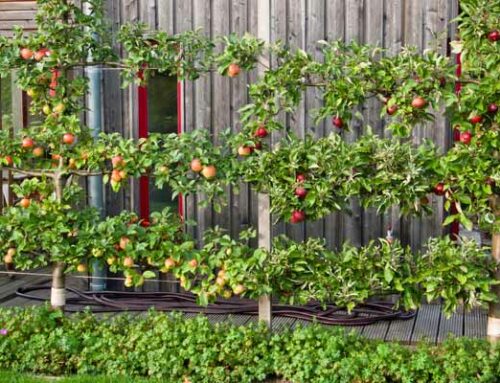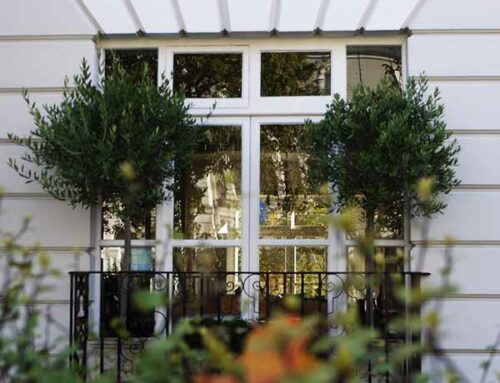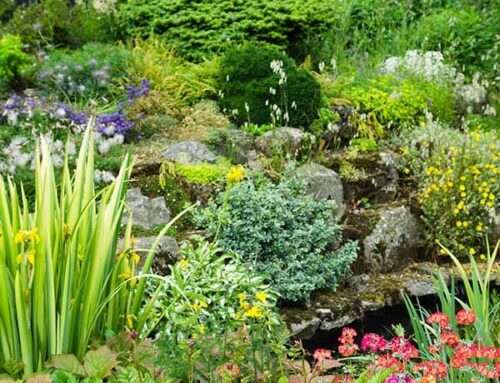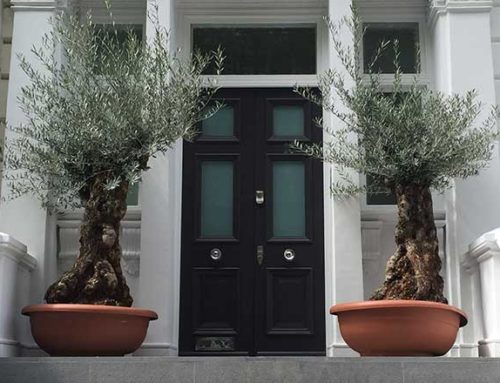Most gardens can accommodate a fruit tree even if they’re very compact because fruit can be grown in some pretty stylish space-saving ways. The massive light-blocking, grass-killing tree is no longer needed to produce a tasty crop of fruits. The best fruit trees for small gardens are often referred to as patio fruit trees and come trained as half standard apples or pears, cordons, container trees and self-pollinating fruit trees. These methods allow the creation of an orchard in the smallest of outside spaces.
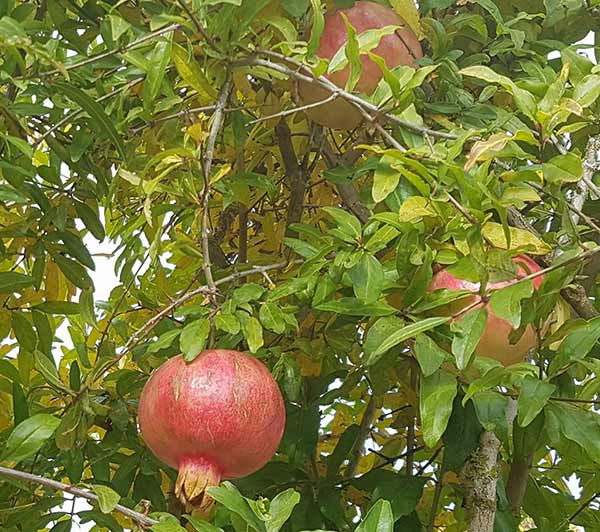
A Pomegranate fruit tree can be trained to fit perfectly in a small garden.
Standards and Half Standards
Standard and half standard trees are traditionally shaped trees with a clear stem trunk and crown of foliage on the top. Half standards are shorter than full standard trees and generally only need an annual prune. A traditional, lollipop-shaped standard or half standard tree at the back of a sunny border can produce plenty of fruit. Try this early fruiting apple tree (Starks Earliest) already trained in a lovely half-standard shape. Stark’s Earliest is moderately self-fertile but will produce a more bountiful crop with an early-blooming pollinating partner. For those of us with smaller gardens, a pair of Stark’s Earliest half-standards in a sunny spot should do the trick. You can also grow these half standards in containers.
For a self-fertilising Full Standard Fruit tree, you could try a 2.5 metre tall Queen Cox apple. Again, prune once per year to maintain the full-standard shape. Other examples of Standard Fruit Trees include Morus Alba Pendula or Weeping White Mulberry which produces edible fruits. If its an evergreen option you are after, the slow-growing Arbutus or Strawberry Tree that fruits in autumn and is a very pretty small tree.
Cordons – Fans and Espaliers
If you’re pushed for space height-wise then the best options are cordoned fruit trees. Cordons are trees that have been pruned and trained on a single main stem with fruiting side branches. They produce lots of fruit when trained along a sunny wall as the heat encourages fruiting and ripens fruit in our unpredictable climate. You could also set up a trellis that partitions your garden – so long as it’s a flat, vertical surface a cordoned fruit tree will climb it.
The most popular shapes are espaliers and fan-trained and there are one-tier step-overs too. Espaliers are a single vertical stem with right-angled horizontal side branches that bear fruit whereas a fan-trained fruit tree takes the form of an attractive spreading fan.
Great fruits for an espalier or fan shape include the ever-popular Royal Gala apple tree, or the RHS Award Of Garden Merit Egremont Russell. Pears make great fan-trained specimens too and you can’t beat Doyenne du Comice or the Conference Pear.
Espaliers and fan-trained fruit trees sit tight to the wall and take up so little lateral room, you can create an orchard of different fruits in the smallest garden so long as you give them a sunny spot. You could even train one over an arch or pergola. If you like the idea of arches and pergolas covered in fruit there’s always the option of a vine fruit. These can be grown in sunny spots of all heights. Try this hardy kiwi fruit or a Grape Vine.
Container Grown Fruit Trees
Often, the best way to grow fruit in a small garden without a lawn or border is to use container grown fruit trees. When a tree is grown in a pot the root system is restricted so it stays smaller. They do need a lot of water and food though so it is a commitment. Examples of fruit trees that can be grown in this way include Try this 2-metre tall quince or any apple, pear or cherry.
If trees don’t tickle your fancy then you can still have beautiful container-grown fresh fruits in the form of a bush. Raspberries, blueberries, gooseberries, and currants are very popular and take up barely any room on a patio or balcony.
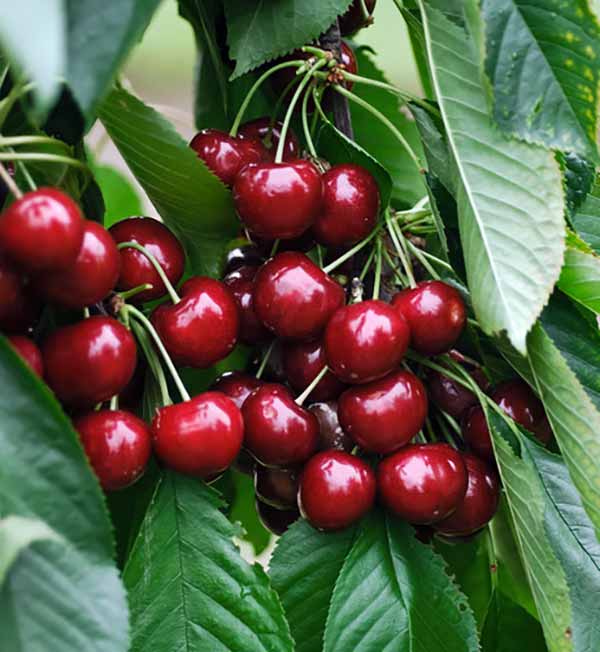
Sunburst Cherry trees for smaller gardens
Self-Fertile Fruit Trees
Some trees need a pollinating partner to produce fruit and that means two trees – not ideal in a small garden. The best fruit trees for a small garden are self-pollinating no matter what form they take. If you’re space-limited, look for small self-fertile varieties like this sweet dessert Apple Domestica Stark, the Sweet Cherry Stella, or an unusual Pomegranate Tree. If you’re interested in branching out into the nut world try this small self-fertile Cobbnut tree.
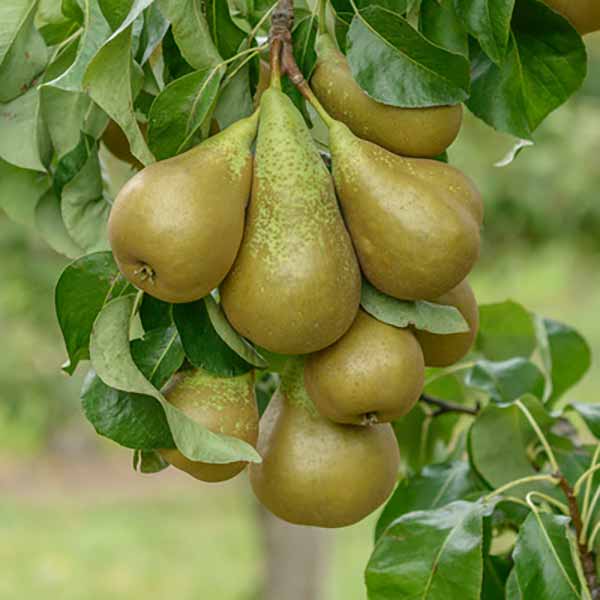
Pyrus Communis Conference Pears
Bring on the Blossom
A sometimes overlooked benefit of planting a fruit tree is its springtime blossom. Fruit tree blossom is always a beautiful sight and pollinators universally love it. Wildlife gardens should always have a fruit tree of some description.
Grow Your Own Small Fruit Orchard
Most of us have a smaller garden than our grandparents and growing large fruit trees is sadly no longer an option – but that doesn’t mean you can’t grow fruit. Self-pollinating, cordoned fruit trees, half standards and patio container trees mean you can grow lots of tasty fruit in a compact space.
It’s worth the effort because a slowly matured home-grown apple or pear is wildly fruitier than a supermarket version – and who doesn’t love grow-your-own? See also our feature on Creating A Garden Orchard.

